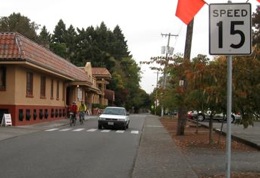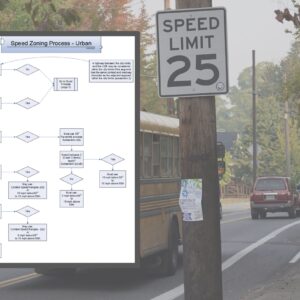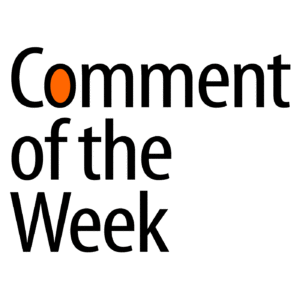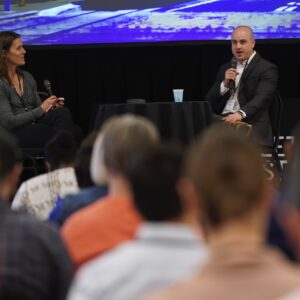
(Photos by Lisa S.)
We’ve been talking a lot about speed lately. With the City looking to take on the issue in Salem this coming legislative session, and the BTA mentioning the positive impacts of lower speeds at every opportunity, it’s becoming clear that 2011 will have a lot of speed-related news.
On that note, a reader sent me an email last week about how she got the City of Portland to install 15 mph speed limit signs on her street. It’s a great example of a citizen taking action and the City listening and responding.
Lisa S. lives on SE 14th Street in the Sellwood neighborhood. She says the three-block stretch of 14th between Duke and SE Bybee (near Llewellyn Elementary School, map here) got a lot of cut-through traffic.
Lisa says her street is only 18 feet wide, so when her husband read a post here on BikePortland that mentioned Oregon’s narrow residential roadway law, he contacted PBOT to ask for 15 mph speed limit signs.

To refresh your memory, ORS 801.368 came from H.B. 2297, a bill sponsored by Rep. Carolyn Tomei that passed the Oregon legislature in 2007. The law defines a “narrow residential roadway” as any street “not more than 18 feet wide at any point between two intersections or between an intersection and the end of the roadway” and “Not of sufficient width to allow one lane of traffic in each direction”. The bill amended Oregon’s basic speed rule so that all such roadways could have a maximum speed limit of just 15 mph.
Lisa said PBOT “was very responsive and very helpful” about getting the new signs installed. Since we all know that reducing speed takes a lot more than signs, Lisa says PBOT has also sent in a request to the Portland Police to do enforcement on her street to help raise awareness of the 15 mph limit.
How’s it going so far? Lisa chimed in with a comment below: “It’s only been a week and so far there are still plenty of drivers going much faster than 15mph. I’m hoping the targeted enforcement will raise awareness of the speed limit… As far as discouraging cut-through traffic, I hope it does have that effect. 18 foot wide streets are just not designed for the volume of cars that use this street to avoid traffic on Milwaukie.”
As this example shows, individual citizens can do a lot to to take control of traffic conditions on residential streets. For more information about speed reduction programs — including the City’s yard sign lending program — visit the PBOT website.







Thanks for reading.
BikePortland has served this community with independent community journalism since 2005. We rely on subscriptions from readers like you to survive. Your financial support is vital in keeping this valuable resource alive and well.
Please subscribe today to strengthen and expand our work.
It would have been great if the city had also done a before and after on traffic counts. I’d like to know if in addition to lowering average speeds if an enforced 15mph speed limit reduces the number of cars using the street.
Lisa S. …nice work! Cut-through’s are the worst, especially when road users doing so further abuse the practice by traveling at excessive speeds and ignore traffic regulations, lights and signs.
15mph, for a short distance on a given stretch of road is an adjustment for people used to traveling 20mph-25mph-30mph and faster, but it’s not bad once it becomes familiar. It can actually become pleasant and relaxing.
it has been suggested to me on some other thread that reducing the number of cars using the street is not a good metric, because this would not “sharing” the road.
That is so ridiculous, I have to keep my cadence under 80 rpm so I am not speeding.
Don’t be silly. Just dump it into low gear and enjoy the ride.
Hi All,
It’s only been a week and so far there are still plenty of drivers going much faster than 15mph. I’m hoping the targeted enforcement will raise awareness of the speed limit.
Since the street has no cross traffic coming from the west side drivers feel safe to speed.
And I asked the principal of the elementary school to put a note in the weekly newsletter to parents. Hopefully they will value this safer speed.
As far as discouraging cut-through traffic, I hope it does have that effect. 18 foot wide streets are just not designed for the volume of cars that use this street to avoid traffic on Milwaukie.
Skid…note the third paragraph in maus’s story. From it: “… the three-block stretch …”. Do you think you might be able to slow down your pace for three blocks without enduring a terrible burden?
Residents may not even object or stress out if bikes exceed the 15mph limit. It’s the danger and noise of motor vehicles that really diminish the livability of little neighborhood streets like this one.
Bjorn…yes… . Before and after traffic counts might be very worthwhile. They could possibly help indicate more than whether or not people simply stay away from the street because they prefer not to travel at 15mph.
It’s kind of funny to remember that in the early days of automobiles, 15mph was clipping right along, and that people then probably enjoyed their traveling much more than those traveling 30mph-60mph today.
@Howdy-Doodoo: It’s a fixed gear and 68 gear inches is low.
Instead of just installing these on 14th, I think they could canvas the neighborhood and install them on all of the extremely narrow streets in Sellwood/Westmoreland. I live 6 blocks from where these signs were installed and our street is also used as a cut-through. It’s extremely narrow and we have tons of kids playing outside all the time. I wish PBOT could be a bit more proactive instead of waiting for someone to complain. If it’s a problem on 14th and you think a 15 mph sign will help, why not install a few more signs on other streets while you’re at it?
Chad,
I hear you about the city being proactive and installing more of these…. but then I think about the sheer volume of streets PBOT is responsible for and I think about how many people they have on staff, their dwindling budget, and all the projects they are working on right now… and then I understand why they can’t do everything all at once. On stuff like this, they respond to community input. I’d strongly suggest you contact the city and start the process, just like Lisa did. Good luck.
Bjorn,
I remember seeing a counter there a few months ago, so they may just have that data at some point.
This is on my route to our school and that stretch can be nasty. I’ve had cars coming the opposite direction going well over the speed limit and giving no ground to opposing traffic, automotive, bicycle or otherwise.
What continues to amaze me is how people (regardless of transportation choice) are offended when neighborhoods want to slow cut-through traffic down. Really? We can’t go 15 mph for a few blocks?
Cut through traffic is the big problem. It plagues my neighborhood and my cycling commute.
My idea is a blocking feature, placed within neighborhoods, that disallow through traffic. Emergency could get through, if necessary. And neighborhood folks would gladly get used to their existence for the benefit of removing cut-through traffic. What is the wonky name for such a feature ?
As follow up, signs are useless without enforcement. Kudos to PBOT for making the request, now let’s see if PPD follows up with some high visibility enforcement.
And I’m on board with Chad, make all residential streets 20 or even 15 mph, and fire up the motors to hand out the tickets.
nice! I cut through there on my bike a couple months ago because I spaced out and missed 17th… hehe… nice neighborhood and no reason anybody needs to go over 15 mph through there…
Ahh, cut-through traffic. I think this is why suburbia is designed with maze-like streets and cul-de-sacs everywhere. It’s hard to have one’s cake and eat it too…
@15 the problem with culdesacs is not their effect on cut through automobile traffic, but the way they discourage cycling by forcing bicyclists to use only the busy arterial streets since none of the side streets go through. Diverters that turn away motor vehicles while allow bike/ped traffic are not in my mind even remotely on the same plane with culdesac development…
This is why it is important to have well designed main streets that allow traffic to flow as freely as possible. I see lots of posts on the board advocating making all streets as unpleasant as possible for cars. If the main arteries work well, you won’t have nearly as many cut throughs. As main roads get worse and worse you will see more and more cut throughs, regardless of speed limit.
Whyat,
Yes, I think you’re right. The cut-through on my street is mostly southbound evening rush hour traffic trying to avoid the Bybee/Milwaukie intersection, where traffic gets backed up behind any left turns. Or just trying to get to the Sellwood Bridge.
The Bybee/Milwaukie intersection was modified to increase safety for people walking, the NE and NW corners were bulbed out, which forced, or encouraged people driving to find alternate routes. So, I guess every action has a reaction.
“This is why it is important to have well designed main streets that allow traffic to flow as freely as possible. …” Whyat #17
Doesn’t matter how well designed they are, with the numbers of people that drive, at certain times of the day, streets will be backed up, and some of those people will seek cut-throughs. Reducing streets’ speed to 15mph though, helps to reduce the negative consequences of that type of traffic jam evasion.
I have no problem with a 20 mph speed limit but 15 mph is just plain silly. My AVERAGE speeds on my daily commute are well above 15 mph (including an the pill hill ascent). IMO, this has law more to do with property owner NIMBYism than any realistic safety concern.
Speed bumps work wonders too…
_many_ students walk and ride bicycles down 14th to and from Llewellyn. 15mph is, if anything, too fast — when I’m walking my children to school there we often have to step out of the way because bike riders are dodging off the road to avoid the cars.
If it were up to me, there’d be a nice jersey barrier at the corner of 14th & Duke to stop commuters. (And if you’re commuting on a bike and can’t slow down to 15mph, may I recommend riding on Milwaukie instead — there are no stop signs there, and it’s wide enough so you can lane split all the way up to the (not actually bulged — the old cutback sidewalks were for the trolley lines that used to run on Milwaukie & Bybee) stop light at Bybee. I find that when I’m moving along at a good clip it’s a lot less pain to ride on the arterial streets instead of doing a constant dance of stops and starts you have to do on secondary streets.)
I don’t recall ever seeing 15 mph sign before. I love it, particularly in this narrow street near a mortuary and elementary school.
15 mph is actually the proper speed in a neighborhood with few controlled intersections and that’s a good thing. If you are traveling much faster than 15 your are going too fast to safely yield right of way (even on a bike).
I am not a big fan of signs and signals because they are typically used to increase motorist speeds. In this case, IF it’s enforced AND obeyed it will be good solution for the cut through problem. The problem with cut through traffic, though, is it’s usually used by those with the least patience and regard to safety.
Good luck and big a big thank you to Lisa!
@Lisa S #6 (et al):
One passive-aggressive teaching aid for the speeders through your neighborhood would be to get in a car and drive exactly 15 mph during the worst traffic periods. Back & forth a few time, or until you get tired of it.
This lets the cut-through folks know that they may not be saving any time with their shortcut, and gets people accustomed to the new speed limit.
Speed limits in all USAF base housing is 15 mph, and you can lose your base driving privilege for 30 days if caught. You get used to it. Speed limit around the flightline (aircraft, bombs, fuel) is 5 mph within 100 ft of those items, and sometimes those items seem to go on for miles.
Love it! I was born and raised in anacortes, wa and every day esp the weekends the ferry traffic was horrendous of yuppies speeding back to the dock to get back south. So I would drive 29 mph the entire 2 mile stretch home of Oakes Ave (30 mile speed limit) with jerk offs trying to pass me and tail gating me all the way to the ferry terminal.
I hate speed bumps aka sleeping policemen too.
Bjorn–
I agree–mazes with dead ends force cyclists onto the worst roads for cycling (at least during heavy traffic times). But cul-de-sacs can serve as diverters when short, connecting MUPs are paved from the end of the cul-de-sac through to the next street over. They don’t do enough of that, though.
Speed bumps are awesome. The well-engineered gradual ones; not the cheap, old-school DIY car and bike killers (Riverview maintenance, I’m looking at you)
C-dawg…I love your idea. You just need a couple neighbors on board with it.
I did that once on my street and once was threatened with physical violence.
Another time a woman raced around me, and peeled up the next street @ close to 40 mph.
When I still rode motorcycles I liked to accelerate onto speed bumps and get air or at least wheelie, so instead of slowing me down I was “stunt riding”. Take that sleeping policeman!
This morning while driving my step daughter to school I had to go around some kids walking 3 abreast on the street (no sidewalk). I did this coasting while covering the brake with my foot and keeping my eyes on them to make sure they didn’t veer in front of me. This maneuver was performed at the blistering speed of 25 mph (not a school zone) and nobody died. Really all it takes is just a little bit of courtesy, caution, and skill. I don’t see anything wrong with expecting people to drive better.
How fast were you going BEFORE you were coasting?! Getting hit at 25 mph if some other kid ran out unexpectedly or a dog can still cause internal damage, broken ribs, dislocations. It can take quite a lot of exceleration to coast at 25.
If all driver and bike riders were to act in a responsible manner by operating their vehicles at a safe speed for the conditions then we wouldn’t have this issue. Some of us are just act selfishly, regardless of mode of transport. Please grow up and act responsible. You wouldn’t want someone flying by your wife/husband/partner and/or children in a threatening manner in a car or a bike….would you?
When I’m in my car, there’s a cut-through I use routinely, and every time, I think that the people who live on that very narrow street must hate the traffic. I do it because Washington County traffic lights are triggered to change by side street traffic and aren’t coordinated at all (what I call The Chaos Theory of Traffic Management), so it’s next to impossible to avoid stopping at four red lights right in a row in a very short distance that I can avoid by cutting through. If car traffic was facilitated, rather than hindered, on the major collectors, motorists would be far less likely to use side streets in an attempt to get to their destination.
Hey NW Biker,
I think the Chaos Theory traffic management you described is responsible for lots of the cut through traffic that plagues many neighborhoods. People driving are incentivised to avoid streets where traffic seems not too flow freely
At least you are considering the people on whose street you are driving, and I’m sure you don’t speed, right?
“If car traffic was facilitated, rather than hindered, on the major collectors, motorists would be far less likely to use side streets in an attempt to get to their destination.”
Exactly. This and other “traffic calming” measures do nothing but frustrate drivers and make them stay on the road longer making more traffic. I thought the idea was to alleviate traffic, not create more.
Hi Lisa,
No, I don’t speed through there. The street is very narrow and there’s a blind curve as well. Oddly, I feel bad for the residents but continue to drive through their neighborhood. It’s either that, or rant at Washington County for poor traffic management efforts. 🙂
NW Biker #30…expensive technology is I think, the reason more arterial streets don’t have sequenced light signals that facilitate traffic flow. I believe Canyon Rd and Beaverton Hillsdale Hwy through Beaverton now has it, but road users can still get caught stopping for each light as the sequence goes through it’s cycle.
“… This maneuver was performed at the blistering speed of 25 mph (not a school zone) and nobody died. …” skid #28
On a wide street, 25mph is tolerable for people outside the cars, as long as that speed is top end. Watching people drive, it’s occurred to me that lots of them don’t think anything of driving 25mph or faster down neighborhood streets. After all, they’re inside the car. They don’t hear the sound their car makes as it goes down the street…the tires, the motor, the wind noise.
If they’re a competent driver, they’ve got their foot covering the brake pedal. Unfortunately, the people outside the car have little way of knowing this. This makes for them, a kind of ‘Be prepared to scatter or die’ situation.
“… One passive-aggressive teaching aid for the speeders through your neighborhood would be to get in a car and drive exactly 15 mph during the worst traffic periods. Back & forth a few time, or until you get tired of it.
This lets the cut-through folks know that they may not be saving any time with their shortcut, and gets people accustomed to the new speed limit. …C-Dawg #24
Interesting idea, if labor intensive. That would be kind of an escort system. In fact, cars or bikes assigned to the task could display a sign: ‘_______ safe streets escort team.
Oliver #27, I too think speed bumps can be a great benefit, one of which is that they can help road users again get used to traveling slower. Super smooth road surfaces and precision designed motor vehicles have brought drivers to become addicted to speed, to the point of where they get stressed if the scenery surrounding them isn’t whipping by at a high rate of speed.
Oh please, ye frustrated commuters. Traffic (esp. cars) can’t flow freely all the time. It’s not engineering. It’s space. If Milwaukie and Bybee were designed to accomdate the three hours of congestion then we’d have to tear down the neighborhood and put in more lanes. YUCK that!
I’d prefer some occasional overflow as long as it is safe and courteous.
Now, here is an experiment I would be interested in http://bikeportland.org/2010/10/14/would-we-be-more-considerate-road-users-without-traffic-lights-41126 What happens to a neighborhood (let’s take Westmorland) when you eliminate all stops signs and traffic signals even on the main streets (Milwaukie and Bybee).
Overall speeds would be forced to drop to accomdate safe yielding. I think there could be more neighborhood cut through traffic, however.
Would it be worth it to eliminate the high speed Milwaukie/Bybee guts? Would the slow speeds push more Clackamas cty motorists onto McCloughlin or their bicycles.
Some will scream bloody murder but I think it’s an experiment worth trying.
when I drive, I generally use the same routes I do when I’m cycling, but I don’t speed and I’m courteous to the cyclists on the route.
Facilitating motor vehicle flow is great, up to a point ( see the many stories related to this one), but it can have unintended consequences. At one point along my route to work, the traffic signal phases were recently changed. The old sequence was left turn green first, then straight-ahead green. This emptied the oncoming left turn lane so that when I crossed the intersection onto a narrow-shouldered, uphill curve, cars pretty much had the empty (oncoming) left turn lane to use to go around me. Now the sequence is reversed so that straight-ahead traffic goes first; this puts me in a gauntlet squeezed between cars waiting to turn left and a 6-inch shoulder with gravel and brush. I’m trying to take the lane a little more assertively, but doing that on an uphill with a flood of pent-up traffic behind me in a 35mph zone makes for quite a stressful couple of minutes. I’m a steady enough rider that I almost prefer letting vehicles squeeze by over having them breathing down my neck.
Good to know that’s a speed trap now, I’ll just take 15th. Fix the screwed-up light timing on Bybee at 17th and at Milwaukee, or add some controlled left turns, and we’ll get a lot fewer cut-throughs.
“Doesn’t matter how well designed they are, with the numbers of people that drive, at certain times of the day, streets will be backed up, and some of those people will seek cut-throughs”
wsbob, there will be “some” cut throughs, but they can be reduced by well-designed arterials.
The problem with the intersections in question are Bybee at Milwaukie and at 17th.
Parking spots need to be removed on the south side of Bybee at both intersections so that cars can pass on the left and on Milwaukie going south. There is often a very long backup caused by a 1-2 eastbound or southbound cars trying to turn left.
Both intersections would benefit from a dedicated left turn lane or signal if the intersection could handle it.
And the lights need to be timed better. The light at 17th turns red just as the light at Milwaukie turns red.
Same issue, btw, has infected 13th and Tacoma. The bike blvd at Spokane was added without any thought to traffic flow along 13th, and now the intersection is actually a hazard. The City has to remove some of the parking spots just south of Spokane. The cut through traffic in that neighborhood has actually increased after the blvd has been put in.